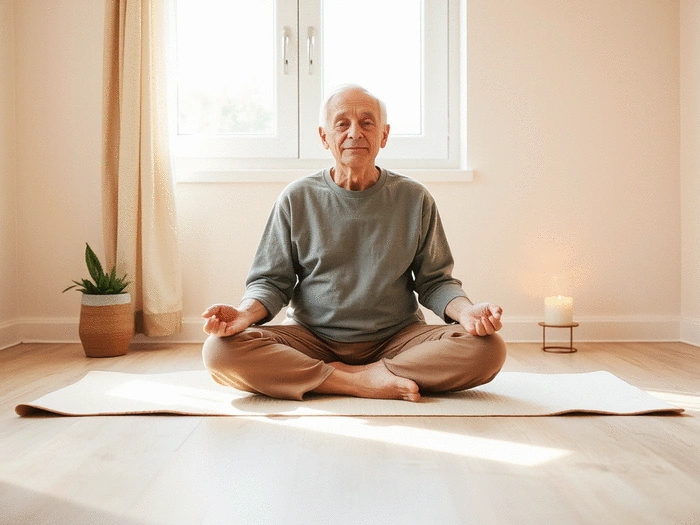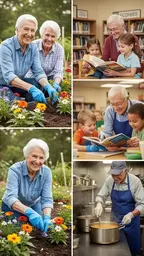Mental Health
Reduces anxiety and enhances mood.
Join the Vital Aging Hub community and receive expert insights, holistic health tips, and inspiring stories directly in your inbox. Let's thrive together!
Posted on: 2025-08-05
By: Elena Hartwell
Did you know that mindfulness can significantly enhance the quality of life for seniors? As we delve into the essence of aging, the practice of mindfulness emerges as a beacon of hope, providing clarity, emotional stability, and profound well-being. Here are some key lessons that highlight the importance of mindfulness in the lives of older adults.
Mindfulness practices significantly enhance various aspects of well-being for seniors, including mental clarity, emotional balance, and physical health. Below is a visual summary of these benefits, represented side by side for easy comparison.
Reduces anxiety and enhances mood.
Improves emotional regulation and resilience.
Strengthens the body and supports overall wellness.
Increases opportunities for community engagement and support.
As we navigate the beautiful journey of aging, mindfulness emerges as a powerful tool for enhancing our well-being. For older adults, being present in the moment can bring a profound sense of peace and clarity. At Vital Aging Hub, we recognize that understanding mindfulness and its benefits is essential for seniors striving to live vibrant, fulfilling lives.
What exactly is mindfulness? It's the practice of focusing our attention on the present moment without judgment. This simple yet transformative skill can significantly impact our mental, emotional, and physical health. By embracing mindfulness, seniors can cultivate resilience and enjoy greater satisfaction in their daily lives!
Mindfulness isn't just a trendy buzzword; it holds real importance for older adults. Many seniors face challenges like loneliness, anxiety, and chronic pain. Mindfulness can provide a much-needed support system, helping us cope with these hurdles. In fact, studies have shown that practicing mindfulness can lead to improved mental clarity and emotional stability.
Here are a few reasons why mindfulness is essential for older adults:
Mindfulness impacts our lives on multiple levels, profoundly affecting our mental, emotional, and physical health. For instance, engaging in regular mindfulness practices can reduce stress and promote a calm mindset. This is especially beneficial as we age, allowing us to handle life's challenges more gracefully.
Moreover, mindfulness can have a positive influence on our emotional health. It helps us cultivate a sense of gratitude and appreciation for the little things, leading to a more joyful existence. When we focus on what we have instead of what we lack, life becomes much more fulfilling!
Here's a brief recap of the key points discussed so far:
As we journey through our golden years, embracing mindfulness can lead to significant improvements in our overall well-being. The benefits of mindfulness for older adults are numerous, enhancing mental clarity, emotional stability, and even physical health! By incorporating mindfulness practices into our daily lives, we can navigate the challenges of aging with grace and vitality.
Research shows that mindfulness can help reduce anxiety, improve sleep, and foster deeper connections with those around us. As we age, these aspects become even more crucial. So, how can we start this transformative journey? Let’s explore practical next steps to introduce mindfulness into our daily routines!
Mindfulness offers a host of benefits, especially for those of us over 50. Here's a quick summary of the key advantages:
As we reflect on our lives, it’s clear that adopting a mindful approach can pave the way for a more fulfilling existence. Imagine spending even just a few minutes each day in quiet reflection or active engagement in the present moment!
Integrating mindfulness into our everyday lives doesn’t have to be overwhelming. Here are some simple steps to get started:
By incorporating these practices, we can build a routine that fosters mindfulness and enriches our lives. If you’re curious about journaling, consider starting a gratitude journal to highlight the positives in your daily life!
Journaling is a powerful tool that can enhance our mindfulness journey. It allows us to express our thoughts and emotions, leading to deeper self-awareness. Here are some tips to make journaling effective:
Through this practice, we can foster a deeper connection with ourselves and appreciate the beauty in each day. It's the perfect way to cultivate mindfulness and enhance our overall outlook on life!
One of the most enriching aspects of practicing mindfulness is the opportunity to connect with others. Engaging in community activities not only supports our individual journeys but also enriches the lives of those around us. At Vital Aging Hub, we believe fostering connections can lead to more meaningful mindfulness practices!
Finding community support can greatly enhance our mindfulness journey. Here are some suggestions for getting involved:
By engaging with others who share similar interests and goals, we can deepen our understanding of mindfulness and create lasting bonds. Sharing experiences and insights can be incredibly rewarding!
As we embrace the practice of mindfulness, we unlock a treasure trove of benefits for our physical and mental well-being. Remember, it’s not just about adopting a practice; it’s about nurturing a lifestyle that celebrates presence and connection. Community centers and wellness programs can provide valuable support, helping us stay committed and engaged in our mindfulness journey!
Many local community centers offer programs that can enhance our mindfulness practices. Here are a few options to consider:
These opportunities not only enrich our mindfulness journey but also foster a sense of belonging. So why not reach out and see what's available in your area? Together, we can support each other in creating a healthier future through mindfulness!
Here is a quick recap of the important points discussed in the article:
Mindfulness is the practice of focusing on the present moment without judgment. It helps improve mental, emotional, and physical health.
Mindfulness can help seniors cope with loneliness, anxiety, and chronic pain, enhance emotional resilience, and promote overall well-being.
Simple practices include journaling, practicing gratitude, guided meditations, and setting aside time each day for mindfulness exercises.
Mindfulness can reduce anxiety, enhance mood, and improve mental clarity, leading to better emotional regulation and resilience.
Engaging in community activities fosters social connections and enriches individual mindfulness journeys, making practices more meaningful and supportive.

 Did you know that engaging in gardening can significantly boost overall wellness, especially for sen
Did you know that engaging in gardening can significantly boost overall wellness, especially for sen
 Volunteering is more than just giving back; it’s a pathway to enhanced well-being for seniors. In
Volunteering is more than just giving back; it’s a pathway to enhanced well-being for seniors. In
 Did you know that maintaining mental sharpness can significantly enhance your quality of life as you
Did you know that maintaining mental sharpness can significantly enhance your quality of life as you